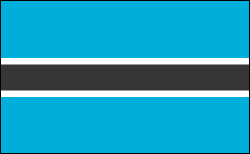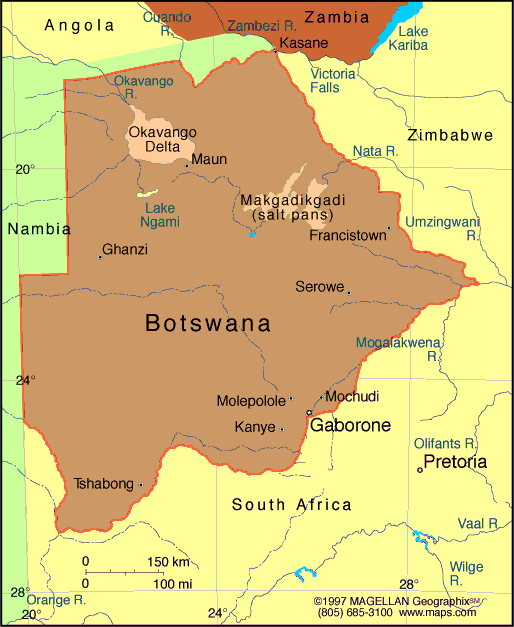BOTSWANA

Geography: Twice the size of Arizona, Botswana is in south-central Africa, bounded by Namibia, Zambia, Zimbabwe, and South Africa. Most of the country is near-desert, with the Kalahari occupying the western part of the country. The eastern part is hilly, with salt lakes in the north.
Government: Parliamentary republic.History: The earliest inhabitants of the region were the San, who were followed by the Tswana. About half the country today is ethnic Tswana. The term for the country's people, Batswana, refers to national rather than ethnic origin.
Encroachment by the Zulu in the 1820s and by Boers from Transvaal in the 1870s and 1880s threatened the peace of the region. In 1885, Britain established the area as a protectorate, then known as Bechuanaland. In 1961, Britain granted a constitution to the country. Self-government began in 1965, and on Sept. 30, 1966, the country became independent. Botswana is Africa's oldest democracy.
The new country maintained good relations with its white-ruled neighbors but gradually changed its policies, harboring rebel groups from South Rhodesia as well as some from South Africa.
Although Botswana is rich in diamonds, it has high unemployment and stratified socioeconomic classes. In 1999, the nation suffered its first budget deficit in 16 years because of a slump in the international diamond market. Yet Botswana remains one of the wealthiest and most stable countries on the continent.
After 17 years in power, President Ketumile Masire retired in 1997, and Festus Mogae, an Oxford-educated economist, became the new president. Mogae has won high marks from the international financial community for continuing to privatize Botswana's mining and industrial operations.

Map of Botswana
President:
Ian Khama (2008)
Land area: 226,012 sq mi (585,371 sq km);
total area: 231,803 sq mi (600,370 sq km)
Population (2014 est.): 2,155,784 (growth
rate: 1.26%); birth rate: 21.34/1000; infant mortality rate: 9.38/1000;
life expectancy: 54.06; note: estimates for
this country explicitly take into account the effects of excess
mortality due to AIDS; this can result in lower life expectancy, higher
infant mortality, higher death rates, lower population growth rates, and
changes in the distribution of population by age and sex than would
otherwise be expected (July 2014 est.)
Capital and largest city (2011 est.):
Gaborone, 202,000
Monetary unit: Pula
Languages:
Setswana 78.2%, Kalanga 7.9%, Sekgalagadi 2.8%, English (official) 2.1%, other 8.6%, unspecified 0.4% (2001 census)
Ethnicity/race:
Tswana (or Setswana) 79%, Kalanga 11%, Basarwa
3%, other (including Kgalagadi and white) 7%
National Holiday:
Independence Day (Botswana Day), September
30
Religions:
Christian 71.6%, Badimo 6%, other 1.4%, unspecified 0.4%, none 20.6% (2001 census)
Literacy rate: 85.1% (2011 est.)
Economic summary: GDP/PPP (2013 est.):
$30.09 billion; per capita $16,400. Real growth rate: 3.9%.
Inflation: 6.1%. Unemployment: 17.8%. Arable land:
0.45%. Agriculture: livestock, sorghum, maize, millet, beans,
sunflowers, groundnuts. Labor force: 1.308 million (2013); agriculture n.a., industry n.a., services n.a.
Industries: diamonds, copper, nickel, salt, soda ash, potash;
livestock processing; textiles. Natural resources: diamonds,
copper, nickel, salt, soda ash, potash, coal, iron ore, silver.
Exports: $7.569 billion (2013 est.): diamonds, copper,
nickel, soda ash, meat, textiles. Imports: $7.389 billion
(2013 est.): foodstuffs, machinery, electrical goods, transport
equipment, textiles, fuel and petroleum products, wood and paper
products, metal and metal products. Major trading partners:
European Free Trade Association (EFTA), Southern African Customs
Union (SACU), Zimbabwe (2004).
Member of Commonwealth of Nations
Communications: Telephones: main
lines in use: 160,500 (2012); mobile cellular: 3.0820 (2012).
Broadcast media: 2 TV stations - 1 state-owned
and 1 privately owned; privately owned satellite TV subscription
service is available; 2 state-owned national radio stations; 3 privately
owned radio stations broadcast locally (2007). Internet hosts:
1,806 (2012). Internet users: 120,000 (2009).
Transportation: Railways: total: 888 km
(2008). Highways: total: 17,916 km;
(2011). Ports and harbors: none. Airports: 74
(2013 est.).
International disputes: none.
-------------------- o --------------------
No comments:
Post a Comment